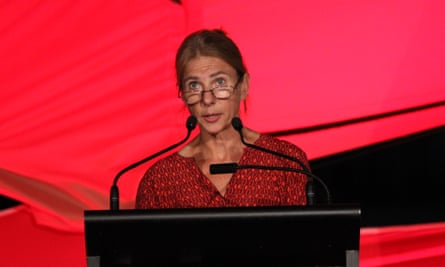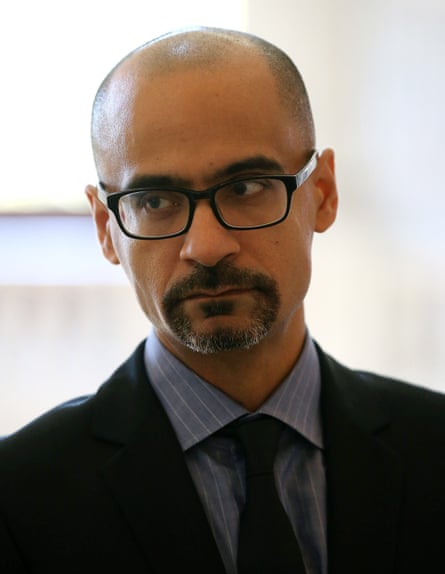A writer, if they are doing their work properly, rubs against the grain of conventional thinking. Writers are often outcasts, heretics and marginalised. Once upon a time writers’ festivals celebrated them, and with them the values of intellectual freedom and freedom of debate. Writing that mattered wasn’t seen as being about being reassured, comforted, deceived and cosseted in our own opinions. Rather it was, as Kafka put it, the axe that smashes the frozen sea within.
But the Brisbane Writers festival, with its decision to drop Germaine Greer and Bob Carr as invited guests, appears to be a cryogenic chamber where the sea can stay perennially frozen, prejudices perfectly preserved forever, unchallenged, unquestioned, uninformed and unformed.
The BWF has form here. When social media lit up around the world following Lionel Shriver’s keynote address at its festival in 2016, the BWF took the unprecedented action of, according to the New York Times, publicly disavowing Shriver’s remarks, effectively abandoning her as a writer, and publicly attacking her for not “speaking to her brief” as if she were a silk hired by the BWF to prosecute an argument.
Anyone who has appeared at a writers’ festival knows organisers are grateful if a writer turns up on time and sober. Anything beyond this minimum is decreed a winning appearance. No one has ever suggested to me that I must stay to a brief or risk punishment.
Shriver’s speech was attacked on the basis of a fiery blog, later republished by the Guardian, by Yassmin Abdel-Magied, who had by her own admission only heard a third of the speech before walking out. Social media lit up predictably enraged, not at Shriver’s speech, which wasn’t publicly available for several days, but Abdel-Magied’s characterisation of it as laying the foundation “for prejudice, for hate, for genocide”. When the speech finally appeared, also in the Guardian, it was hard to see how it did such a thing, and even critics conceded it was far more nuanced than it had been attacked as on social media. By then though it was too late.
For Shriver, the talk was about the damage identity politics could do to writing. For her critics it was about belittling the movement against cultural appropriation. Whichever position you took, the debate was important. Shriver had done what you would think a festival would long for all its guests to do.

But instead the BWF betrayed Shriver when she was at her most vulnerable, suffering attacks both in person, being shouted at as a racist at the festival, and online, where the commentary was predictably one of mounting savagery.
Rather than remaining above the social media fury, none of it based on what Shriver had said, the BWF poured fuel on to it by suggesting Shriver had broken some unspoken covenant. Instead of pointing out Shriver was a writer doing what a writer should, by not defending her right to say what she said, this made the vast amount of hate being levelled at Shriver seem justified and justifiable.
The Shriver controversy was the first time Australian writers’ festivals began to feel like a foreign country occupied by a strange regime, hostile to what writing stands for. But it wasn’t the last.
Earlier this year came the Junot Diaz affair. The Pulitzer Prize-winning novelist withdrew from the Sydney Writers’ festival following American writer Zinzi Clemmons publicly alleging that Diaz had forcibly kissed her some years before. Further allegations of verbal bullying and demeaning behaviour were made by other women. Diaz cancelled the rest of his tour and returned to America.
Diaz now denies Clemmons’s claim, which she stands by, as do the other women by theirs. An internal investigation by MIT, where Diaz teaches, found, however, no “information that would lead us to take any action or restrict” Diaz in his position on their faculty. Diaz’s position as a fiction editor at the Boston Review was subject to an inquiry about his behaviour and it has decided to retain Diaz as editor.
None of this proves Diaz is a good person. But nor does it prove he is a bad one. There were allegations, and there remain allegations. Diaz may be a monster, or he may not. But the allegations remain, and they remain allegations.
So on what grounds was the Sydney Writers’ festival justified in passing judgment on a writer about things the truth of which was not established?
The festival, in its statement announcing his departure, referred to Diaz’s essay The Silence: The Legacy of Childhood Trauma published a few months earlier in which Diaz revealed that he had been raped as a child.
“In his recent New Yorker essay, Mr Diaz wrote, ‘Eventually the past finds you’. As for so many in positions of power, the moment to reckon with the consequences of past behaviour has arrived.
“Sydney Writers’ festival is a platform for the sharing of powerful stories: urgent, necessary and sometimes difficult. Such conversations have never been more timely.
“We remain committed to ensuring they occur in a supportive and safe environment for our authors and audiences alike.”
We may ask what on earth was supportive and safe for Diaz in those words? Who had the power at that moment – the writer, who had publicly confessed to being raped as a child only a few months before, or the festival?
The Wheeler Centre, meanwhile, emailed ticket holders to announce that Diaz had also cancelled a scheduled appearance in Melbourne with similarly self-serving cant:
“We always take seriously our responsibility to ensure that our platform and our spaces are safe for our guests and audiences alike,” its statement said. “The Wheeler Centre is inspired by the bravery of those sharing their stories and is committed to an accountable and responsive literary community for everyone.”
None of this is to argue for or against Junot Diaz. But is it to be the case that Australian writers’ festivals will abandon any writer once social media turns against them? And what if the mob have it wrong?

And now we have the bizarre case of Germaine Greer and Bob Carr.
I don’t overly care for the recent thoughts of either, and I am confident they would feel the same about me.
And surely that is the point – that other people’s thoughts are worth listening to.
Except, that is, if you are the Brisbane Writers festival.
Recently appointed BWF acting chief executive, Ann McLean, has made a number of cringing defences to her decision to drop both writers from the BWF in her correspondence to Melbourne University Press, publisher of Greer and Carr.
Bob Carr, she wrote “was unsuitable for the topic – What the World Needs Now – and would instead just talk about his new book”.
The unspoken truth of every writers festival is that the topic is always unsuitable for the writer. Topics are understood by all concerned as at best a jumping off point to a general conversation. McLean’s title may not be the worst I’ve ever heard, but who in the audience wouldn’t be hoping someone gets away from a song made famous by Sergio Mendez 60 years ago and onto another subject, and quickly.
And to criticise a writer for talking about their book makes no sense – for what other reason is the writer at a writers’ festival, and what gives the writer their authority to say anything, if not their book?
McLean makes an even odder defence of dropping Germaine Greer, arguing that “concerns about the likelihood of media coverage of Germaine possibly overshadowing other writers on the program.”
If the BWF is a writers’ festival concerned not to get publicity they are unique on this earth. And perhaps they are, because McLean, in a moment of clarifying folly, says that Bob Carr’s invitation was being withdrawn in “consideration for the brand alignment of several sponsors we are securing for the festival”.
Does this mean money chooses which writers you hear – and don’t hear – at the BWF? Exactly when did the Brisbane Writers festival become the Brisbane Corporate festival? And since when did writing in Australia answer to corporate dictate?
There are questions that should be answered by the BWF. Why were Carr and Greer blackballed? And by whom? When did the BWF stop seeing its role as supporting writers ahead of corporations? Is Greer being dropped because her views on rape are not those of the prevailing orthodoxy? Is Carr being dropped because of his views on Israel or population?
This is not an article I wanted to write. But as forums for public debate and discussion vanish throughout the country, in a week when Nine has announced the takeover of Fairfax, the importance of community events like writers’ festivals only grows in importance. They should not answer either to the mob or to corporations. They should be there for writers and writing, and all that these represent: tolerance, debate, difference.
Ponder all that we now know about how social media is manipulated by power, both national and corporate. Why, with that knowledge, would a writers’ festival ban writers because of fear of a social media backlash?
Beneath their determined, if dreary, attempts at funkiness and fashion, beyond the latest New Yorker sensation imported for our provincial enlightenment, past the wearying social media feeds with their ersatz excitement, writers’ festivals now run the risk of running with dogma, with orthodoxy, with the mob – with fear, in other words – and with money. It’s the new Victorian age wearing a hipster beard.
Of course, not all writers’ festivals are like this. But the large ones are increasingly becoming that way. If they were to rename themselves “Festival of Safe Ideas”, or “Celebration of Conventional Thinking”, or “Festival Approved by Twitter Bots” I wouldn’t mind. But having dropped two writers because, it would seem, of what they have written, for Brisbane to call itself a writers’ festival smacks of false advertising.
The individual examples of Shriver, Diaz, Carr and Greer, all point to a larger, more disturbing trend. Writers’ festivals, like other aspects of the literary establishment such as prizes, have in recent years become less and less about books and more and more about using their considerable institutional power to enforce the new orthodoxies, to prosecute social and political agendas through reward and punishment.
Some will argue that this is exactly what writers’ festivals should be doing.
Perhaps.
But it isn’t what writing is. It isn’t what good books are. What were, for a time, important moments in Australian public life now feel at best lost, and at worst hostile to writing.
In the very first modern novel, Don Quixote, the old orthodoxies of romance, rank and status, are relentlessly mocked. Freedom, says Don Quixote to Sancho Panza, is the most precious gift of all.
Who would have thought it would be writers’ festivals that would now act against such freedom?
McLean is quoted in the Australian as saying the BWF was “fully prepared to embrace controversy”.
What nonsense. The BWF embraces conformity, and two who threaten that conformity it punishes by banning. In doing so, it’s an enforcer, not an enabler; a punisher, and not a promoter.
Around Australia there are many good people who care about what books mean working in writers’ festivals as organisers, directors, and volunteers. I have been to enough festivals to see how much discussions and talks there mean to their audiences. And in recent years, as the other places for public debate – the media, politics – have withered and collapsed, I have seen how writers’ festivals have come to mean even more.
And now, more than ever, we need places and forums where we can listen, reflect and discuss different perspectives and ideas that are not our own. This is not to suggest promoting propagandists and provocateurs to an equal footing with serious writers – but it is to argue that writing worthy of the name is not always comforting or reassuring, but that it does matter. The alternative is a Trumpian world of mindless Milo Yiannopoulos provocations on one side, and conformist clap trap on the other, both serving only to deliver power to those who would destroy us.
Writers’ festivals are meant to be an assembly of the republic of letters, not the tyranny of social media pile ons, or the fiat of corporate whim. The Brisbane Writers festival should have the largeness and the wisdom to recognise it has made a damaging error, admit it got it wrong, and reaffirm its support for all writers and the very idea of literature, of intellectual freedom, by reinviting Germaine Greer and Bob Carr.
That it won’t shows that not only a newspaper giant, Fairfax, with all that means, was lost this week. For what can be sensed also vanishing is our courage to listen to others other than our tribe. And that loss is larger than I dare to ponder.
- Support our independent journalism with a one-off or monthly contribution

